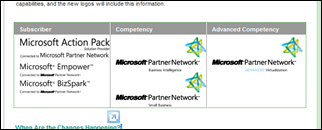I’ll miss Gold Partner status in the Microsoft Partner Program I think.
It’s not that my company LobsterPot Solutions will no longer qualify for Gold status, but that the Program is changing. It’s becoming the Microsoft Partner Network instead. These changes are rolling out at the moment, and October 2010 is the day when the big switch is being made. And I should make it clear that I don’t work for Microsoft, and I can’t guarantee that there aren’t mistakes in what I’m writing.
 Under the Partner Program, partners could earn points by having customer references, employing MCPs, and various other things. If you reached 50 points, this meant the Microsoft Certified Partner brand could be used, but if you reached 120 points, the Microsoft Gold Certified Partner brand would apply. For LobsterPot, we enrolled in the program when it became clear we would have the 50 points, but surprisingly quickly reached 120. Within the program, we have “competencies” in Business Intelligence, Data Management, Web Development and in Learning Solutions. But we specialise in the first two. Always happy to provide some Web Development or Training, that’s very much part of the business, but the core is SQL Server.
Under the Partner Program, partners could earn points by having customer references, employing MCPs, and various other things. If you reached 50 points, this meant the Microsoft Certified Partner brand could be used, but if you reached 120 points, the Microsoft Gold Certified Partner brand would apply. For LobsterPot, we enrolled in the program when it became clear we would have the 50 points, but surprisingly quickly reached 120. Within the program, we have “competencies” in Business Intelligence, Data Management, Web Development and in Learning Solutions. But we specialise in the first two. Always happy to provide some Web Development or Training, that’s very much part of the business, but the core is SQL Server.
Under the Partner Network, the points system is being removed, and the tiers will be put on the Competencies, rather than the overall membership. LobsterPot will no longer be a Gold Certified Partner, but will be a Partner with Advanced Competency. And getting an Advanced Competency is becoming much harder than before.
There will still be Standard Competencies, which have similar requirements to the current set of competencies under the Partner Program. Typically, these require two MCPs and three Customer References. And the MCPs could contribute to other competencies, so that a two-man shop could easily pick up a number of competencies if they’re working in that area.
But the goal will be the Advanced Competencies. These require four MCPs (although an MCM counts as two), and these MCPs must have passed the higher-level certifications such as MCITP or MCPD. Furthermore, these MCPs cannot contribute to more than one Advanced Competency. So to have three Advanced Competencies, twelve different MCPs would be required. The number of customer references required has gone up from three to five. And there are other requirements such as an amount of revenue (dependent on a number of factors which I believe are still unclear).
Do I like the idea of losing Gold Partner status? No – I think “Microsoft Gold Certified Partner” is a strong brand, and it’s a shame to lose that.
Do I like the idea of having an Advanced Competency that differentiates LobsterPot from other companies that only have Standard Competencies? Yes! This should mean that potential clients have an easier time of realising that we’re more interested in giving someone a BI solution than giving them a pretty web site – but that we can do both if needed.
My conclusion is that it’s generally a positive move, but I have had to make a bigger effort to make sure enough of my staff have MCITP, and it’s a shame that we’re not large enough to pick up the Advanced Competency in both BI and Data.
For more information, please go to http://partner.microsoft.com, which should be regarded as the authority on all this.




This Post Has 6 Comments
It seems like that takes away the incentive to have more than say two MCITPs. I mean if you only can use one to help your company then what’s the point in having more than one. I have 5 MCITPs myself but under this new system it seems there will be no point for me to ever get certified in SQL 11 because they will surely still accept my SQL 2008 MCITPs nmeaning that I won’t need to bother getting another MCITP until SQL 12.
I would also suggest to re-visit Microsoft regional directors program.
Those people must be nominated by Microsoft, elected for 2 years only and voted only by MVPs/MCPs.
Let’s say we have got 5 nominees and only one could be elected for Sydney (NSW) for 2 years.
We don’t need 3 regional directors for Sydney.
Hi Aaron – actually, you should still pursue more, because you can still contribute towards multiple Standard Competencies. And you never know which Advanced ones your company is likely to go for.
I think certification is always worth having. It demonstrates all kinds of good qualities, particularly an interest in professional development.
It seems like people are always looking for reasons to not get certified. I think it shows that you have some initiative and care about your professional development. It can also help you get further through the screening process if you are in the job market. It also helps your company achieve Partner competencies, which increases your value as an employee.
Of course certification is not a substitute for hands-on experience, knowledge and common sense. More people should just take the exams, and be done with them as each new major version of SQL Server comes out.
Glenn – I agree. From my experience in helping create the exams, they’re designed to allow people working in the field to be able to pass with no (or little) additional extra study. In which case, you can easily maintain certification level and prove your worth to employers (particularly if they’re partners) by doing exams when they come out (even in beta, which count as passing the live one too). All SQL professionals should do the relevant exams.
And… it’s quite telling that the Advanced Competencies in BI and Data both require the 2008 certs. So it’s definitely worth being up-to-date.
The only thing I don’t like is that MCPs cannot contribute towards multiple Advance competencies.